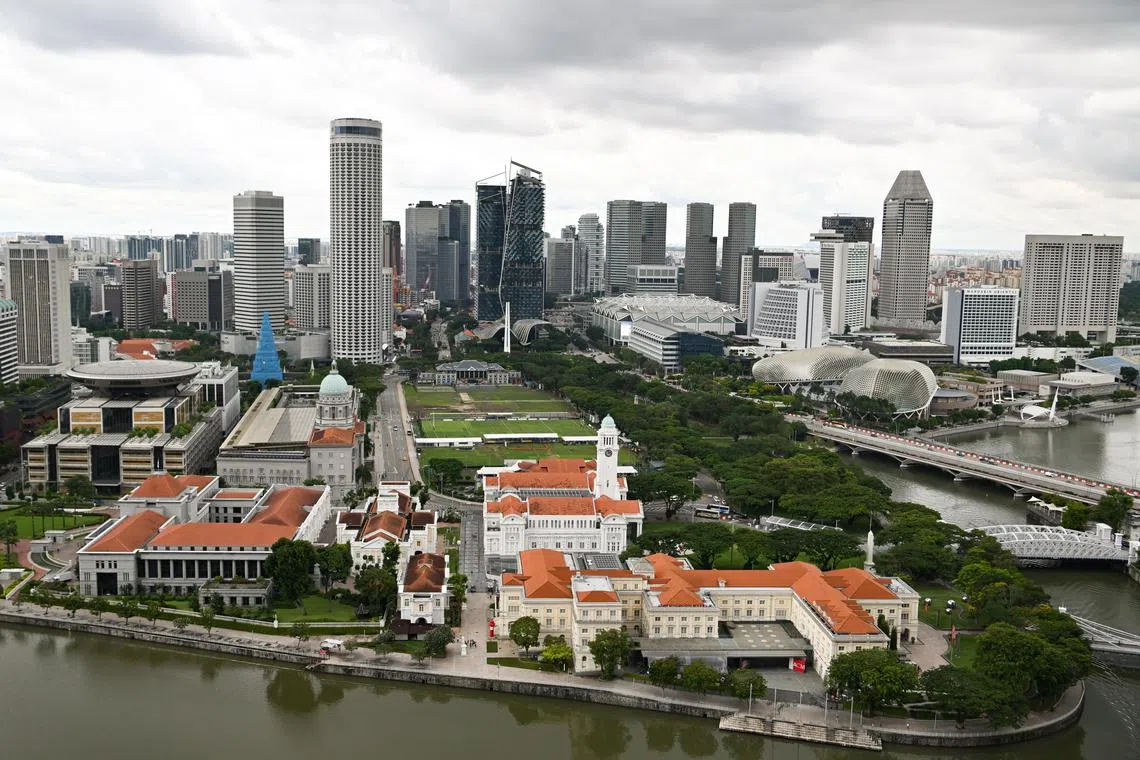Budget debate: Huge difference in FY2024 surplus projection prompts questions in Parliament
Sign up now: Get ST's newsletters delivered to your inbox

Some MPs asked in Parliament why there was such a large deviation in the Government’s revenue projections.
ST PHOTO: LIM YAOHUI
SINGAPORE - The large deviation in surplus projections for fiscal year (FY) 2024 was raised several times in Parliament in the past two days in the Budget debate.
MPs were heartened that Singapore’s national coffers have been boosted by better-than-expected revenue in FY2024 that meant a surplus of $6.4 billion – a reversal from an overall Budget deficit of $2.6 billion in FY2023.
However, some noted that the surplus for FY2024 was revised from an original estimate of $778 million, prompting questions as to why there was such a large deviation in the Government’s revenue projections.
Mr Xie Yao Quan (Jurong GRC), who is with the People’s Action Party (PAP), on Feb 27 said if elections were really the prime motivation behind this Budget, “the Government must be mad to not have spent down more of this surplus on short-term measures, whether cash or vouchers”.
Instead, the Government has left an estimated $13 billion in surpluses over FY2024 and FY2025 in an election year, he said.
Mr Xie recalled how the current Government had started the five-year term with an unprecedented deficit of over $50 billion, primarily because of the pandemic.
“This surplus in FY2024 and the projected surplus in FY2025 and importantly, excluding the drawdown from past reserves, taken together, these will really just allow the Government to finish its five-year term more or less balanced,” he said.
Mr Xie said this is something successive PAP Governments have committed to do, as opposed to the cynical view that the Government has been collecting more taxes and monies than the nation needs.
“I think Singaporeans can instead draw confidence that these surpluses represent this PAP Government’s consistency and the will to maintain fiscal prudence over its entire term of government, across many terms of government, past and well into future terms of government,” he said.
His remarks follow questions from other MPs as to why the surplus projections are so off the mark, and if there was a need to increase the goods and services tax (GST) the last two years.
Ms Sylvia Lim (Aljunied GRC), who is with the Workers’ Party, on Feb 27 said total operating revenue for FY2024 was $116.6 billion, or about $8 billion higher than the estimated amount.
Prime Minister and Finance Minister Lawrence Wong had said in his Budget speech on Feb 18 that this surplus was largely due to a better-than-expected collection from corporate income tax.
Corporate income tax in FY2024 came in at $30.9 billion, more than the estimated $28 billion.
Calling the original projection of $778 million “a substantial underestimation”, Ms Lim said about $5 billion of the $8 billion came from significant rises in categories such as vehicle quota premiums or COEs (certificates of entitlement), GST, statutory boards’ stamp duties and personal income taxes.
She said the higher-than-expected collections reflect the financial pressures Singaporean families face.
Ms Lim referred to PM Wong’s parliamentary answer in September when he said the projected surplus would be $778 million and asked: “Was there an awareness at that point of the significant deviations from projections? If so, should an updated estimate have been provided? If not, why was this discrepancy not identified earlier?”
Non-Constituency MP Leong Mun Wai, from the Progress Singapore Party, on Feb 27 lauded the Budget as a generous one.
But he noted that the government has collected about $8 billion more revenue each year than its original estimates in 2022, 2023 and 2024.
“The People’s Action Party Government has always claimed that there is tight fiscal headroom, but if year after year surpluses are always bigger than what is estimated, then it really calls into question why the Government decided to inflict so much pain on Singaporeans by raising GST in 2023 and 2024 amid high global inflation,” Mr Leong said.
He said Budget marksmanship is important so that Parliament and Singaporeans have a clear idea of the nation’s fiscal resources.
Mr Leong also touched on the net investment returns contribution (NIRC), which refers to the returns on investments of Singapore’s reserves.
The NIRC is derived from up to 50 per cent of the investment returns from the Monetary Authority of Singapore, sovereign wealth fund GIC and Singapore’s investment company Temasek.
In FY2024, NIRC came in at $24 billion.
Mr Leong said a large part of surplus budget resources arising from the NIRC each year have been transferred to many endowment and trust funds, intended for future spending over the long term.
But he said the Government needs to better utilise the NIRC and Budget resources so that Singaporeans are financially resilient without having to rely on ad hoc handouts.
Others like PAP MP Derrick Goh (Nee Soon GRC) said the fiscal surplus, whether expected or unexpected, speaks to a prudent and conservative approach that is sensible.
He said the more important question is how the surpluses will be used to further enhance Singapore’s infrastructure and capabilities.
Mr Goh said the NIRC is projected to rise from $24 billion in 2024 to $27.1 billion in 2025.
Given prevailing global uncertainties that may slow long-term returns and the already modest gross domestic product projections for 2025, he asked if PM Wong can share insights on the Finance Ministry’s assumptions on why the estimated NIRC for 2025 is higher than in 2024.
Mr Goh added: “Also, if indeed surpluses are expected to continue, are there opportunities to recalibrate the pace and amount of taxation to allow markets to be more efficient and to ease rent and labour cost pressures, while still upholding fiscal prudence?”
The Budget debate will end on Feb 28, and will be followed by debate on the budgets of various ministries.



